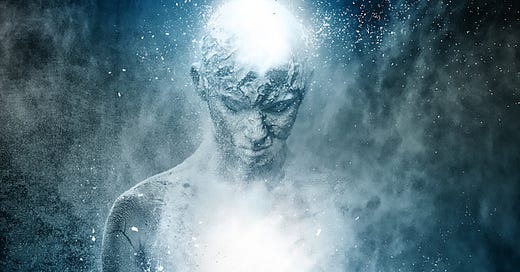In the not-so-distant future, we’re promised the death of death.
Radical life extension. Cryonics. AI-backed consciousness transfer. Organ regeneration on demand. Digital selves that outlive flesh. And yet, in all this striving to escape death, something far more insidious may be dying: our resilience, our renewal, and our capacity to let go.
Could deathlessness itself become an existential risk?
Immortality as Existential Stagnation
The dream of overcoming death has ancient roots from the elixirs of Taoist alchemists to the Christian promise of eternal life. But today, that dream is turning technological. Biohackers, transhumanists, and venture-funded labs are investing billions in making sure we don’t die, at least not soon, and maybe not at all.
But what happens when nothing ends?
If death is removed from the equation, so too is the natural cycle of evolution, of one generation yielding to the next, of ideas being allowed to fall away so others can take root. In a society where no one leaves, what happens to the collective imagination? What happens to dissent, revolution, and innovation when the same minds hold power indefinitely, unchallenged by the churn of mortality?
When no one dies, succession falters. Systems accumulate without release. Stuck leaders, outdated ideologies, and broken institutions no longer cleared by generational turnover, become frozen in place. Immortality risks becoming a kind of societal sclerosis.
And it’s not just politics. Culture, too, can suffer. Creative movements often begin as ruptures - bold rejections of what came before. But if the creators of the old guard never truly exit, do we lose the urgency to create something new?
Without death, how do we reset? Without loss, what propels us forward?
The Grief We Deny, the Growth We Postpone
Death is not just an end. It’s an initiator. It compels change, invites meaning, and shapes memory. Grief cracks us open to transformation. Letting go of people, dreams, and identities is the cost of becoming someone new.
Grief is alchemy. It unravels us, yes, but it also teaches us to weave new patterns from the frayed threads of what once was. A world without death might also be a world without real grief. And in doing so, it becomes a world that forgets how to metabolize change.
When we resist grief, we delay growth. We flatten our emotional spectrum. And in doing so, we weaken the soul’s musculature; the part of us that knows how to rebuild after ruin, how to find light after descent.
If we can always back up our minds, preserve every version of ourselves, never truly lose anything... what becomes of ritual? Of legacy? Of learning to say goodbye?
It’s tempting to think that a life without endings is a gift. But endings don’t just cause pain, they shape purpose. They give texture to our timelines. Without them, we risk becoming emotionally weightless, unable to land, forever hovering between versions of ourselves that never quite finish forming.
Cryopreservation and the Myth of the Unbroken Thread
Cryonics sells the illusion of continuity, that a frozen self is a paused story. But death, as it is now, insists on rupture. It teaches humility. It creates space for the living.
Suspending the body in liquid nitrogen does not suspend the world around it. Generations move on. Culture evolves. Language, ethics, and politics all flow forward. To re-enter that current decades or centuries later is not to resume one’s life, but to enter as a ghost. The thread may be unbroken, but the loom has changed.
Cryopreservation is a bet against entropy, but entropy is what allows us to become something new. It’s the fall of the old structure that permits new architecture to emerge.
Even digital consciousness, uploaded minds in simulated worlds, may tether us to infinite feedback loops of selfhood, unable to evolve. We risk becoming archival echoes: Preserved, perfect, and unchangeable.
There’s a kind of psychic claustrophobia that comes with endless continuity. When nothing is allowed to fade, there is no mystery, no mythos, no compost for the soul. The myth of immortality as evolution misunderstands something ancient and essential: That transformation requires disintegration. And that true memory, deep memory, is often carried forward not through endless replication, but through reverent forgetting.
Resilience Is Rooted in Mortality
True resilience doesn’t come from being unkillable. It comes from surviving loss. From adaptation, from grieving well, from knowing when to let things die so something new can live.
In nature, resilience isn’t about permanence, it’s about flexibility. The tree that bends in the wind survives the storm. The one that refuses to bend snaps. The river doesn’t resist the stone; it shapes it over time, adapting its course as it flows.
So too with human systems. We learn not through perfection, but through breakage. Mistakes, endings, heartbreaks - these are the crucibles in which wisdom is born.
Deathlessness robs us of this deep resilience. We begin to fear endings more than stagnation. And in that fear, we begin to calcify systems, identities, and stories. We invest in preservation over emergence, in continuity over courage.
And what happens to compassion in a deathless world? If we no longer share the universal inevitability of death, do we begin to lose the very thing that binds us together as mortal beings? Mortality humbles us, equalizes us. In refusing it, we risk also refusing the most tender truths of being human.
What if the true existential risk isn’t dying, but becoming unchangeable?
The Ecosystem Knows Better
Nature relies on decay. Compost feeds the soil. Predation maintains balance. Forest fires renew the land. Without death, life chokes on its own abundance.
The natural world doesn’t hoard. It cycles. Leaves fall. Bodies return to the earth. Even stars collapse so new ones can form. Death is not the antithesis of life—it is its co-creator.
The future must learn from the forest: Transformation, not preservation, is what ensures survival. To mimic the wisdom of ecosystems means embracing entropy as a creative force. It means designing technologies and societies that understand when to let go, not just how to persist.
Letting go is not a failure of will. It is a sacred skill.
The Death of Death Must Not Be the Death of Life
So perhaps the question is not how to live forever, but how to live well, with the knowledge of our impermanence. Even in a world of downloaded minds and designer bodies, perhaps we must choose, still, to die.
To let go.
To regenerate.
Because the end is not the enemy.
The refusal to end might be.
If you enjoyed reading this article, please consider buying me a coffee so I can keep writing




